Top Rated Virginia Speeding Ticket Lawyer • 1500+ Reviews
 Riley & Wells Attorneys-At-Law is an established Virginia law firm that defends clients accused of speeding. Our Virginia Speeding Ticket Lawyers possess over 60 years of collective experience of successfully representing clients. We can ensure that your rights are protected, that you are not intimidated in the courtroom, and that you increase your chances of securing a better result than you could obtain. Our firm has been favorably rated more than any other law firm in the Commonwealth that defends speeding cases. CAUTION: A conviction for speeding will on average, increase the automobile insurance premium by 20%-30% EACH YEAR, according to a study conducted by Insurance.com
Riley & Wells Attorneys-At-Law is an established Virginia law firm that defends clients accused of speeding. Our Virginia Speeding Ticket Lawyers possess over 60 years of collective experience of successfully representing clients. We can ensure that your rights are protected, that you are not intimidated in the courtroom, and that you increase your chances of securing a better result than you could obtain. Our firm has been favorably rated more than any other law firm in the Commonwealth that defends speeding cases. CAUTION: A conviction for speeding will on average, increase the automobile insurance premium by 20%-30% EACH YEAR, according to a study conducted by Insurance.com
***Our attorneys are licensed to practice law in all Virginia Courts***
30,000+ Clients Represented
1500+ Client Reviews
60+ Years of Combined Experience
Effective VA Speeding Traffic Violation Attorneys
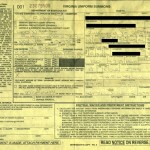
Virginia Uniform Summons
Virginia ranks as one of the toughest states on speeders. A VA Speeding Ticket is probably the most common type of traffic violation in Virginia. Consult a top rated Virginia speeding ticket lawyer before you attempt to plead guilty. NOTE: Receiving a citation for speeding is NOT a conviction. A conviction can negatively affect you in many ways. Excessive fines. Assessment of moving violation demerit points to your driving record. Loss of driving privileges depending on speed and prior convictions. Increased insurance premiums. We can protect your interests. Let us review your case!
Successful Virginia Speeding Defense Attorney Client Review
Interstate Speeding Traffic Court Defense Lawyers
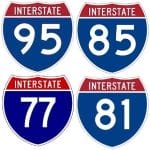 Virginia interstates are heavily traveled. There are over 1,118 interstate miles in VA. Primary highways total 8111 miles and consist of U.S. Routes and primary state routes. There are also 48,305 miles of secondary routes in the Commonwealth. These roads attract the attention of State Troopers and County Deputy Sheriffs. Driving too fast for too long on a VA interstate will likely get noticed by law enforcement. Do NOT plead guilty without consulting an attorney specializing in traffic law defense. Our top rated attorneys have extensive experience defending this type of case. We defend speeding cases before the Virginia courts every week. We know how to defend your case best.
Virginia interstates are heavily traveled. There are over 1,118 interstate miles in VA. Primary highways total 8111 miles and consist of U.S. Routes and primary state routes. There are also 48,305 miles of secondary routes in the Commonwealth. These roads attract the attention of State Troopers and County Deputy Sheriffs. Driving too fast for too long on a VA interstate will likely get noticed by law enforcement. Do NOT plead guilty without consulting an attorney specializing in traffic law defense. Our top rated attorneys have extensive experience defending this type of case. We defend speeding cases before the Virginia courts every week. We know how to defend your case best.
VA Reckless Driving Speeding Attorneys
 There are over 10 different VA reckless driving laws. The most enforced and also the most serious type of speeding offense is the Reckless Driving Ticket pursuant to Va. Code 46.2-862. Reckless driving in VA is a criminal misdemeanor violation. A driver is guilty of reckless driving for traveling at 20 miles per hour or more above the speed limit OR over 85 miles per hour regardless of the speed limit. There are many places on Virginia interstates where the speed limit is 70 miles per hour. Driving 16 mph over the 70 mph speed limit can trigger this harsh law. Our top rated speeding lawyers successfully represent clients who have been charged with violating this law.
There are over 10 different VA reckless driving laws. The most enforced and also the most serious type of speeding offense is the Reckless Driving Ticket pursuant to Va. Code 46.2-862. Reckless driving in VA is a criminal misdemeanor violation. A driver is guilty of reckless driving for traveling at 20 miles per hour or more above the speed limit OR over 85 miles per hour regardless of the speed limit. There are many places on Virginia interstates where the speed limit is 70 miles per hour. Driving 16 mph over the 70 mph speed limit can trigger this harsh law. Our top rated speeding lawyers successfully represent clients who have been charged with violating this law.
Riley & Wells Attorneys-At-Law Defend VA Speeding Cases
- 46.2-862 Reckless Driving-Speeding
- 46.2-870 Speeding
- 46.2-871 School Buses
- 46.2-872 Special Permits
- 46.2-873 School Zones
- 46.2-874 Business or Residential District
- 46.2-873.2 Rural Rustic Roads
- 46.2-877 Impeding the Flow of Traffic
- 46.2-878 Change Speed Limits
- 46.2-878.1 Highway Work Zone
- 46.2-878.2 Certain Residential Districts
- 46.2-947 Highway Safety Corridor
Free Consultation with Top Rated Virginia Speeding Ticket Lawyer
 Some drivers think they do not need a Virginia speeding ticket lawyer for their speeding ticket. The answer depends on your circumstances and the seriousness of the case. The biggest issues with representing yourself is the lack of experience and legal knowledge. The average motorist does not understand the best course of action. Our experienced speeding ticket attorneys know the best tactics and options for obtaining the best results. Our lawyers spend hours in the Virginia Traffic Courts every week and are familiar with the habits of the different judges and the law enforcement officers who issue the speeding tickets. This local knowledge can prove to be invaluable in deciding how to best defend a speed case.
Some drivers think they do not need a Virginia speeding ticket lawyer for their speeding ticket. The answer depends on your circumstances and the seriousness of the case. The biggest issues with representing yourself is the lack of experience and legal knowledge. The average motorist does not understand the best course of action. Our experienced speeding ticket attorneys know the best tactics and options for obtaining the best results. Our lawyers spend hours in the Virginia Traffic Courts every week and are familiar with the habits of the different judges and the law enforcement officers who issue the speeding tickets. This local knowledge can prove to be invaluable in deciding how to best defend a speed case.
Uniform Summons Speeding Ticket Issued by VA Police
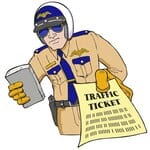 A Uniform Summons is the legal document issued by VA law enforcement officers during a traffic stop for speeding. Most people refer to this document as either a speeding ticket or traffic citation. The summons serves as legal notice for the alleged violation. Signing the summons is not an admission of guilt. The summons advises you that a trial date has been set in the District Court. A law enforcement officer can also issue a summons for criminal offenses such as reckless driving and other misdemeanor offenses. Allow us to review your summons. We can develop a defense strategy for your VA speeding case even if you think you are guilty.
A Uniform Summons is the legal document issued by VA law enforcement officers during a traffic stop for speeding. Most people refer to this document as either a speeding ticket or traffic citation. The summons serves as legal notice for the alleged violation. Signing the summons is not an admission of guilt. The summons advises you that a trial date has been set in the District Court. A law enforcement officer can also issue a summons for criminal offenses such as reckless driving and other misdemeanor offenses. Allow us to review your summons. We can develop a defense strategy for your VA speeding case even if you think you are guilty.
Attorneys Defending RADAR and LIDAR Speeding Cases
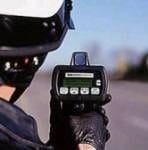 State Troopers, Deputy Sheriffs and Police Officers use various speed detection devices to gather evidence in speeding cases. VA law enforcement officers must be trained by the Virginia Department of Criminal Justice Services before they can use RADAR or LIDAR for enforcement purposes. There are various steps that must be followed for a law enforcement officer’s testimony about a speed result to be admissible. Va. Code 46.2-882 must also be following in speeding cases. Our Virginia speeding ticket lawyers know how to defend theses cases. We know the best strategies to use at trial to protect our clients. Increase your chances of successfully dealing with your Virginia speeding ticket by contacting us today for a free initial consultation.
State Troopers, Deputy Sheriffs and Police Officers use various speed detection devices to gather evidence in speeding cases. VA law enforcement officers must be trained by the Virginia Department of Criminal Justice Services before they can use RADAR or LIDAR for enforcement purposes. There are various steps that must be followed for a law enforcement officer’s testimony about a speed result to be admissible. Va. Code 46.2-882 must also be following in speeding cases. Our Virginia speeding ticket lawyers know how to defend theses cases. We know the best strategies to use at trial to protect our clients. Increase your chances of successfully dealing with your Virginia speeding ticket by contacting us today for a free initial consultation.
Virginia Speeding Ticket Lawyer General District Court
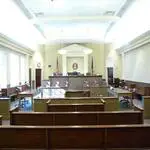 Adult motorists accused of speeding will likely be issued a Virginia Uniform Summons by the law enforcement officer. A trial date will be set before a General District Court. Trials are adversarial by design. The criminal justice system involves a structured and formalized dispute between the Commonwealth Attorney’s Office and the defense. This system is designed to ensure a fair trial process subject to the rules of law and evidence by allowing each side to present their case and to be able to challenge the other’s arguments and evidence. The District Court Judge ultimately evaluates the evidence, arguments, and the credibility of witnesses to reach a verdict. This system ensures that the prosecution meets its high standard of proof.
Adult motorists accused of speeding will likely be issued a Virginia Uniform Summons by the law enforcement officer. A trial date will be set before a General District Court. Trials are adversarial by design. The criminal justice system involves a structured and formalized dispute between the Commonwealth Attorney’s Office and the defense. This system is designed to ensure a fair trial process subject to the rules of law and evidence by allowing each side to present their case and to be able to challenge the other’s arguments and evidence. The District Court Judge ultimately evaluates the evidence, arguments, and the credibility of witnesses to reach a verdict. This system ensures that the prosecution meets its high standard of proof.
Speed Trap in VA Small Cities and Towns
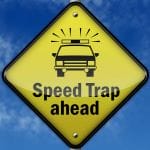 There are plenty of speed traps in VA. Speed traps are an area of the road where police officers hide in order to detect vehicles exceeding a speed limit. But a recent study conducted by Governing Magazine reveals that it may be small cities and towns like Sussex, Brunswick and Emporia/Greensville are particularly aggressive with enforcing the speed limit. The study found that Town of Eastville on the Eastern Shore in Northampton County relies more on traffic fines for revenue, with an astounding 72% of its budget coming from traffic fines and forfeitures. We are the premier Virginia speeding ticket lawyers that will present your best defense.
There are plenty of speed traps in VA. Speed traps are an area of the road where police officers hide in order to detect vehicles exceeding a speed limit. But a recent study conducted by Governing Magazine reveals that it may be small cities and towns like Sussex, Brunswick and Emporia/Greensville are particularly aggressive with enforcing the speed limit. The study found that Town of Eastville on the Eastern Shore in Northampton County relies more on traffic fines for revenue, with an astounding 72% of its budget coming from traffic fines and forfeitures. We are the premier Virginia speeding ticket lawyers that will present your best defense.
Virginia Speeding Ticket Lawyer Client Review
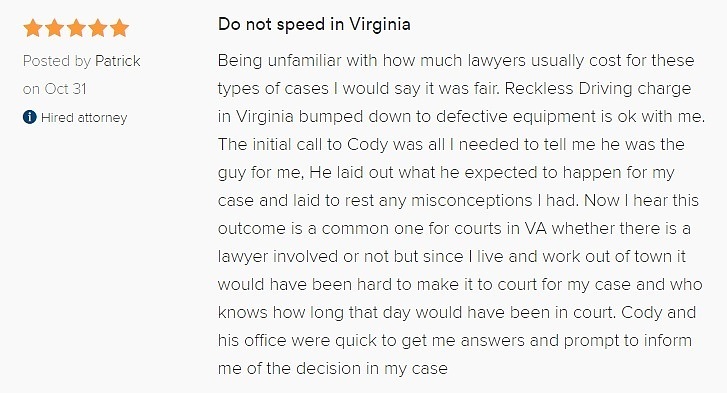
Speedometer Calibration For VA Speeding Ticket Cases
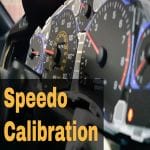 There are instances in Virginia speeding ticket cases where the defendant is operating a motor vehicle with a defective speedometer. A speedometer calibration may assist our top rated VA speeding ticket lawyers. A speedometer calibration is a specialized test performed by certain mechanics that measures the accuracy of a vehicle’s speedometer. Not just any mechanic can perform this type of diagnostic test. The test comes with a report showing whether the speedometer was off and if so, by how many miles per hour. An experienced Virginia speeding ticket lawyer will introduce evidence of the calibration results pursuant to Va. Code 46.2-942. Such evidence shall be considered by the court in both determining guilt or innocence and in fixing punishment.
There are instances in Virginia speeding ticket cases where the defendant is operating a motor vehicle with a defective speedometer. A speedometer calibration may assist our top rated VA speeding ticket lawyers. A speedometer calibration is a specialized test performed by certain mechanics that measures the accuracy of a vehicle’s speedometer. Not just any mechanic can perform this type of diagnostic test. The test comes with a report showing whether the speedometer was off and if so, by how many miles per hour. An experienced Virginia speeding ticket lawyer will introduce evidence of the calibration results pursuant to Va. Code 46.2-942. Such evidence shall be considered by the court in both determining guilt or innocence and in fixing punishment.
Driver Improvement Program For VA Speeding Ticket
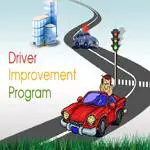 A Driver Improvement Program or Traffic School is an educational course designed to improve the knowledge and driving skills of participants. One reason a driver may complete a Driver Improvement Program is to provide a pathway for motorists to mitigate the consequences of their VA Speeding Ticket. Completing a program may assist our top rated Virginia speeding ticket lawyers in convincing the Judge to dismiss or reduce the case. The duration of a Driver Improvement Program can either be a 12 hour or 8 hour course. The program has in person and online formats. Consult our Virginia speeding ticket lawyers to understand your options before you pursue a driver improvement program for your traffic case.
A Driver Improvement Program or Traffic School is an educational course designed to improve the knowledge and driving skills of participants. One reason a driver may complete a Driver Improvement Program is to provide a pathway for motorists to mitigate the consequences of their VA Speeding Ticket. Completing a program may assist our top rated Virginia speeding ticket lawyers in convincing the Judge to dismiss or reduce the case. The duration of a Driver Improvement Program can either be a 12 hour or 8 hour course. The program has in person and online formats. Consult our Virginia speeding ticket lawyers to understand your options before you pursue a driver improvement program for your traffic case.
VA Speeding Ticket REDUCED to Defective Equipment is a WIN
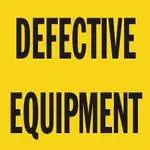 In some cases, the Judge is unwilling to completely dismiss a speeding ticket case completely on a NOT GUILTY verdict. This is where a top rated Virginia speeding ticket lawyer may be able to use the defective speedometer law to the client’s advantage. The defective speedometer law pursuant to Va. Code 46.2-1080 makes it unlawful to operate a vehicle on a highway with a speedometer that is not in good working order. This law is a traffic violation but is a non-moving violation no demerit point offense. So, convincing the General District Court Judge to find our client guilty of defective speedometer in a speeding case is a victory. Speedometer calibration evidence is not always necessary.
In some cases, the Judge is unwilling to completely dismiss a speeding ticket case completely on a NOT GUILTY verdict. This is where a top rated Virginia speeding ticket lawyer may be able to use the defective speedometer law to the client’s advantage. The defective speedometer law pursuant to Va. Code 46.2-1080 makes it unlawful to operate a vehicle on a highway with a speedometer that is not in good working order. This law is a traffic violation but is a non-moving violation no demerit point offense. So, convincing the General District Court Judge to find our client guilty of defective speedometer in a speeding case is a victory. Speedometer calibration evidence is not always necessary.
Virginia Speeding Ticket Laws
Va Code § 46.2-862 Reckless driving; exceeding speed limit
A person is guilty of reckless driving who drives a motor vehicle on the highways in the Commonwealth (i) at a speed of 20 miles per hour or more in excess of the applicable maximum speed limit or (ii) in excess of 85 miles per hour regardless of the applicable maximum speed limit.
Va Code § 46.2-870 Maximum speed limits generally
Except as otherwise provided in this article, the maximum Virginia speed limit shall be 55 miles per hour on interstate highways or other limited access highways with divided roadways, nonlimited access highways having four or more lanes, and all state primary highways.
The maximum Virginia speed limit on all other highways shall be 55 miles per hour if the vehicle is a passenger motor vehicle, bus, pickup or panel truck, or a motorcycle, but 45 miles per hour on such highways if the vehicle is a truck, tractor truck, or combination of vehicles designed to transport property, or is a motor vehicle being used to tow a vehicle designed for self-propulsion, or a house trailer.
Notwithstanding the foregoing provisions of this section, the maximum Virginia speed limit shall be 70 miles per hour where indicated by lawfully placed signs, erected subsequent to a traffic engineering study and analysis of available and appropriate accident and law-enforcement data, on (i) interstate highways; (ii) multilane, divided, limited access highways; and (iii) high-occupancy vehicle lanes if such lanes are physically separated from regular travel lanes.
The maximum Virginia speed limit shall be 60 miles per hour where indicated by lawfully placed signs, erected subsequent to a traffic engineering study and analysis of available and appropriate accident and law-enforcement data, on U.S. Route 17, U.S. Route 23, U.S. Route 29, U.S. Route 58, U.S. Alternate Route 58, U.S. Route 301, U.S. Route 360, U.S. Route 460, U.S. Route 501 between the Town of South Boston and the North Carolina state line, State Route 3, and State Route 207 where such routes are nonlimited access, multilane, divided highways.
Va Code § 46.2-871 Maximum speed limit for school buses
The maximum speed limit for a Virginia school buses shall be 45 miles per hour or the minimum speed allowable, whichever is greater, on any highway where the maximum speed limit is 55 miles per hour or less, and 60 miles per hour on all Virginia interstate highways and on other highways where the maximum speed limit is more than 55 miles per hour.
Va Code § 46.2-872 Maximum speed limit for vehicles operating under special permits
The maximum Virginia speed limit shall be fifty-five miles per hour on any highway having a posted speed limit of fifty-five miles or more per hour if the vehicle or combination of vehicles is operating under a special permit issued by the Commissioner in accordance with § 46.2-1139 or § 46.2-1149.2. The Commissioner may, however, further reduce the speed limit on any permit issued in accordance with § 46.2-1139.
Va Code § 46.2-873 Maximum speed limits at school crossings; penalty
A. For the purposes of this section, “school crossing zone” means an area located within the vicinity of a school at or near a Virginia highway where the presence of children on such school property or going to and from school reasonably requires a special warning to motorists. Such zones are marked and operated in accordance with the requirements of this section with appropriate warning signs or other traffic control devices indicating that a school crossing is in progress.
B. The maximum Virginia speed limit shall be 25 miles per hour between portable signs, tilt-over signs, or fixed blinking signs placed in or along any highway and bearing the word “school” or “school crossing.” Any signs erected under this section shall be placed not more than 750 feet from the limits of the school property or crossing in the vicinity of the school.
However, “school crossing” signs may be placed in any location if the Department of Transportation or the council of the city or town or the board of supervisors of a county maintaining its own system of secondary roads approves the crossing for such signs. If the portion of the highway to be posted is within the limits of a city or town, such portable signs shall be furnished and delivered by such city or town. If the portion of highway to be posted is outside the limits of a city or town, such portable signs shall be furnished and delivered by the Department of Transportation.
The principal or chief administrative officer of each school or a school board designee, preferably not a classroom teacher, shall place such portable signs in the highway at a point not more than 750 feet from the limits of the school property and remove such signs when their presence is no longer required by this section. Such portable signs, tilt-over signs, or fixed blinking signs shall be placed in a position plainly visible to vehicular traffic approaching from either direction, but shall not be placed so as to obstruct the roadway.
C. Such portable signs, tilt-over signs, or blinking signs shall be in a position, or be turned on, for 30 minutes preceding regular school hours, for 30 minutes thereafter, and during such other times as the presence of children on such school property or going to and from school reasonably requires a special warning to motorists. The governing body of any county, city, or town may, however, decrease the period of time preceding and following regular school hours during which such portable signs, tilt-over signs, or blinking signs shall be in position or lit if it determines that no children will be going to or from school during the period of time that it subtracts from the 30-minute period.
D. The governing body of any city or town may, if the portion of the highway to be posted is within the limits of such city or town, increase or decrease the speed limit provided in this section only after justification for such increase or decrease has been shown by an engineering and traffic investigation, and no such increase or decrease in speed limit shall be effective unless such increased or decreased speed limit is conspicuously posted on the portable signs, tilt-over signs, or fixed blinking signs required by this section.
E. The governing body of a county within Planning District 8 may, if the portion of the highway to be posted is within the limits of such county, increase or decrease the speed limit provided in this section only after justification for such increase or decrease has been shown by an engineering and traffic investigation, and no such increase or decrease in speed limit shall be effective unless such increased or decreased speed limit is conspicuously posted on the portable signs, tilt-over signs, or fixed blinking signs required by this section.
F. The City of Virginia Beach may establish school zones as provided in this section and mark such zones with flashing warning lights as provided in this section on and along all highways adjacent to Route 58.
G. Any person operating any motor vehicle in excess of a maximum speed limit established specifically for a school crossing zone when such school crossing zone is (i) indicated by appropriately placed signs displaying the maximum speed limit and (ii) in operation pursuant to subsection B shall be guilty of a traffic infraction punishable by a fine of not more than $250, in addition to other penalties provided by law.
H. Notwithstanding the foregoing provisions of this section, the maximum speed limit in school zones in residential areas may be decreased to 15 miles per hour if (i) the school board having jurisdiction over the school nearest to the affected school zone passes a resolution requesting the reduction of the maximum speed limit for such school zone from 25 miles per hour to 15 miles per hour and (ii) the local governing body of the jurisdiction in which such school is located enacts an ordinance establishing the speed-limit reduction requested by the school board.
Va Code § 46.2-873.1 Maximum speed limit on nonsurface-treated highways
The maximum Virginia speed limit on nonsurface-treated highways, which are roads that are comprised of an earth-aggregate or aggregate surface (i.e., dirt and gravel) that have not been stabilized with a bituminous or cementitious material, shall be 35 miles per hour. The maximum speed limit upon such highways may be increased or decreased by the Commissioner of Highways or other authority having jurisdiction over highways. However, such increased or decreased maximum speed limit shall be effective only when indicated by sign on the highway. For such highways upon which maximum speed limit is not indicated by sign, the maximum speed limit shall be 35 miles per hour.
Va Code § 46.2-873.2 Maximum speed limit on rustic rural roads
The maximum Virginia speed limit on any highway designated a rural rustic road pursuant to § 33.2-332 shall be 35 miles per hour; however, all speed limits on rural rustic roads in effect on July 1, 2008, shall remain in effect unless and until changed subsequent to a traffic engineering study.
Va Code § 46.2-874 Maximum speed limit in business and residence districts
The maximum Virginia speed shall be 25 miles per hour on highways in business or residence districts, except on interstate or other limited access highways with divided roadways or nonlimited access highways having four or more lanes and all state primary highways. The speed limit on all nonlimited access highways having four or more lanes and all state primary highways shall remain as indicated by signs posted prior to July 1, 2005, unless changed as provided by law.
Va Code § 46.2-874.1 Authority to increase penalties in residence districts
A. The governing body of any Virginia town with a population between 14,000 and 15,000 may by ordinance (i) prohibit the operation of a motor vehicle at a speed of twenty miles per hour or more in excess of the applicable maximum speed limit in a residence district and (ii) provide that any person who violates the prohibition shall be subject to a mandatory civil penalty of $100, not subject to suspension.
B. The governing body of the City of Falls Church, or the City of Manassas may by ordinance (i) prohibit the operation of a motor vehicle at a speed of fifteen miles per hour or more in excess of the applicable maximum speed limit in a residence district, as defined in § 46.2-100 of the Code of Virginia, when indicated by appropriately placed signs displaying the maximum speed limit and the penalty for violations, and (ii) provide that any person who violates the prohibition shall be subject to a civil penalty of $100, in addition to other penalty provided by law.
Va Code § 46.2-875 Maximum speed limit on certain other highways in cities and towns
The maximum speed limit shall be 35 miles per hour on Virginia highways in any city or town, except on interstate or other limited access highways with divided roadways and in business or residence districts. However, municipalities that maintain their own roads may increase or decrease speed limits on highways over which they have jurisdiction following appropriate traffic engineering investigation.
Va Code § 46.2-876 Maximum speed limit for passenger vehicles towing certain trailers
The maximum speed limit for passenger motor vehicles while towing utility, camping, or boat trailers not exceeding an actual gross weight of 2,500 pounds shall be the same as that for passenger motor vehicles.
Va Code § 46.2-877 Minimum speed limits
No person shall drive a motor vehicle at such a slow speed as to impede the normal and reasonable movement of traffic except when reduced speed is necessary for safe operation or in compliance with law.
Whenever the Commissioner of Highways or local authorities within their respective jurisdictions determine on the basis of a traffic engineering and traffic investigation that slow speeds on any part of a Virginia highway consistently impede the normal and reasonable movement of traffic, the Commissioner or such local authority may determine and declare a minimum speed limit to be set forth on signs posted on such highway below which no person shall drive a vehicle except when necessary for safe operation or in compliance with law.
Va Code § 46.2-878 Authority to change speed limits.
A. Notwithstanding the other provisions of this article, and except as otherwise provided in subdivision A 4 of § 46.2-1300, the Commissioner of Highways or other authority having jurisdiction over Virginia highways may decrease the speed limits set forth in § 46.2-870 and may increase or decrease the speed limits set forth in §§ 46.2-873 through 46.2-875 on any highway under its jurisdiction and may establish differentiated speed limits for daytime and nighttime by decreasing for nighttime driving the speed limits set forth in § 46.2-870 and by increasing for daytime or decreasing for nighttime the speed limits set forth in §§ 46.2-873 through 46.2-875 on any highway under his jurisdiction.
Such increased or decreased speed limits and such differentiated speed limits for daytime and nighttime driving shall be effective only when prescribed after a traffic engineering investigation and when indicated on the highway by signs. It is unlawful to operate any motor vehicle in excess of speed limits established and posted as provided in this section. The increased or decreased speed limits over highways under the control of the Commissioner of Highways shall be effective only when prescribed in writing by the Commissioner of Highways and kept on file in the Central Office of the Department of Transportation.
Whenever the speed limit on any highway has been increased or decreased or a differential speed limit has been established and such speed limit is properly posted, there shall be a rebuttable presumption that the change in speed was properly established in accordance with the provisions of this section.
B. Notwithstanding any other provision of this article, including the provisions of subsection A, the governing body of any town located entirely within the confines of a United States military base may by ordinance reduce the speed limit to less than 25 miles per hour on any highway within its boundaries, provided such reduced speed limit is indicated by lawfully placed signs.
C. If the Commissioner of Highways increases or decreases a speed limit as provided in this section, the Department of Transportation shall notify the primary liaison with the Department of Transportation in each locality in which such speed limit change will occur. If such speed limit change will occur in a town, the Department of Transportation shall notify the primary liaison in the town and the primary liaison in the county in which the town is located.
If such speed limit change will occur in a community subject to the Property Owners’ Association Act (§ 55.1-1800 et seq.) or the Virginia Condominium Act (§ 55.1-1900 et seq.), the locality shall also notify the relevant board of directors, as defined in § 55.1-1800, or executive board, as defined in § 55.1-1900, respectively.
Any notice sent to a locality, board of directors, or executive board as required in this subsection shall include the location where the speed limit change will occur, the effective speed limit change date, the new speed limit, and the reason for the speed limit change. Failure to comply with any provision of this subsection shall not affect the change in speed limit.
Va Code § 46.2-878.1 Maximum speed limits in highway work zones; penalty.
Operation of any motor vehicle in excess of a maximum speed limit established specifically for a Virginia highway work zone, when workers are present and when such highway work zone is indicated by appropriately placed signs displaying the maximum speed limit and the penalty for violations, shall be unlawful and constitute a traffic infraction punishable by a fine of not more than $500.
For the purposes of this section, “highway work zone” means a construction or maintenance area that is located on or beside a highway and marked by appropriate warning signs and, for projects covered by contracts entered into on or after July 1, 2012, with attached flashing lights or other traffic control devices indicating that work is in progress.
Nothing in this section shall preclude the prosecution or conviction for reckless driving of any motor vehicle operator whose operation of any motor vehicle in a highway work zone, apart from speed, demonstrates a reckless disregard for life, limb, or property.
Va Code § 46.2-878.2 Maximum speed limits in certain residence districts of counties, cities, and towns; penalty.
Operation of any motor vehicle in excess of a maximum speed limit established for a Virginia highway in a residence district of a county, city, or town, when indicated by appropriately placed signs displaying the maximum speed limit and the penalty for violations, shall be unlawful and constitute a traffic infraction punishable by a fine of $200, in addition to other penalties provided by law. No portion of the fine shall be suspended unless the court orders 20 hours of community service. The Commissioner of Highways or any local governing body having jurisdiction over highways shall develop criteria for the overall applicability for the installation of signs.
Such criteria shall not exclude highways, functionally classified as minor arterials, serving areas that either (i) were built as residential developments or (ii) have grown to resemble residential developments, provided, in either case, (a) such highways are experiencing documented speeding problems and (b) the local governing body requests the application of this section to such highway.
Such signs may be installed in any town and shall not require the approval of the county within which such town is located. Any such signs installed in any town shall be paid for by the town requesting the installation of the signs, or out of the county’s secondary system construction allocation.
Va Code § 46.2-878.2:1 Maximum speed limits on certain roads.
Operation of any motor vehicle in excess of the maximum speed limit established for U.S. Route 15 and U.S. Route 17 in Fauquier County, when indicated by appropriately placed signs displaying the maximum speed limit and the penalty for violations, shall be unlawful and shall constitute a traffic infraction punishable by a fine of $15, in addition to other penalties provided by law. Subject to the issuance of a permit by the Commissioner of Highways, the county may, at its own expense, install and maintain such signs.
Let us review YOUR case. We can help!
11/10/2015 | Updated 8/11/2024
